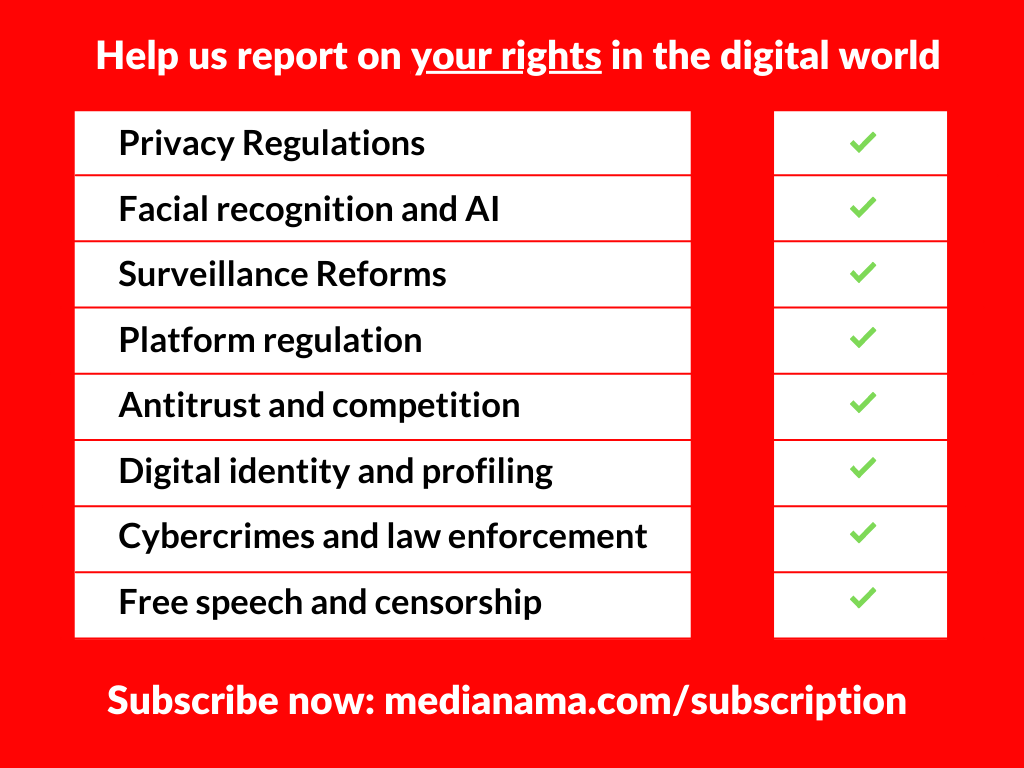“The Commission is of the view that there exists a prima facie case with respect to some of the conduct of Zomato and Swiggy, which requires an investigation,” the Competition Commission of India (CCI) stated in its order dated April 4. The order is the result of a complaint filed by the National Restaurant Association of India (NRAI) against Zomato and Swiggy in July 2021 alleging anticompetitive practices like bundling of services, data masking, exorbitant commissions, deep discounting, and violation of platform neutrality.
The Director-General is now expected to carry out a detailed investigation and submit a report to CCI within 60 days. As with any antitrust case, the CCI will first delineate the relevant markets under consideration and determine the market dominance of the companies in question before examining if the companies are engaging in any anticompetitive practices to maintain their dominance.
Dear reader, we urgently need to build capacity to cover the fast-moving tech policy space. For that, our independent newsroom is counting on you. Subscribe to MediaNama today, and help us report on the policies that govern the internet.
What is the relevant market?
- NRAI has proposed the restaurant marketplace with delivery services in various hyperlocal areas across India as the relevant market given that the anti-competitive actions of Zomato and Swiggy are from the perspective of restaurant partners and that the market is hyperlocal in nature as food delivery is restricted in the range of only a few kilometres.
- Swiggy and Zomato propose a wider relevant market: In response, Swiggy proposed the relevant product market as “market for the provision of listing and logistics services for cooked food” and Zomato suggested that the relevant product market should include all logistic delivery companies such as DotPe, Dunzo, Shadowfax, Delhivery, etc., and direct ordering to the restaurants.
- CCI states no precise relevant market is needed: There is no need to go into precise relevant market delineation and suffice to say that Zomato and Swiggy are prominent online food delivery platforms, CCI stated.
How dominant are Swiggy and Zomato?
- They have significantly high and durable market shares: NRAI submitted that Zomato’s market share is close to 52% in terms of gross order volume and Swiggy commands a market share of 43% in the market.
- Both platforms enjoy strong network effects by relying on a successful “fly-wheel” effect. On the restaurant side, they added more partners by reducing or waiving commissions and on the consumers’ side, these platforms gave huge discounts.
- Significant entry barriers: The market consists of only two major players as these companies have absorbed any new, credible players. Furthermore, both platforms collect data from customers to personalise their experiences, which further dissuades new players from entering the relevant market, NRAI alleged.
What are the alleged anticompetitive practices?
Taking advantage of their significant market power and compounding network effect and strong barriers to entry, Zomato and Swiggy enforce vertical agreements and impose vertical restraints on the restaurant partners, NRAI alleged.
1. Bundling food ordering and food delivery services
NRAI alleged that Zomato and Swiggy bundle their food delivery services with the food ordering services by not giving restaurants the option to use alternate delivery services. This bundling is anti-competitive because it forecloses competition in the downstream market for hyperlocal deliveries, NRAI said.
Zomato and Swiggy responses:
- Can harm platform reputation if left to restaurants: Zomato and Swiggy submitted that bundling has been done to control the end-to-end user experience. Both platforms argued that they would not be able to resolve consumer complaints if last-mile delivery is left to restaurants and as a consequence, consumers experiencing poor delivery service would switch to other competing platforms, resulting in a decline in brand value and reputation of the platform and consequently resulting in loss to other restaurants listed on its platform.
- Zomato partners can use alternate delivery methods if they demonstrate adequate capabilities: Zomato submitted that restaurants can deliver to end consumers if they meet certain criteria. NRAI, however, objected to this stating that these criteria are not clearly specified. Zomato also submitted that it piloted a programme to allow self-delivery but it did not have a positive outcome.
CCI analysis:
- Bundling does not raise any competition concerns: CCI dismissed this allegation saying that bundling allows Zomato and Swiggy to control the time taken for delivery and qualitatively standardise such delivery for the end consumer. Unlike other e-commerce platforms, in the case of the food delivery market, time taken for delivery is of the essence and real-time tracking plays a pivotal role, CCI stated.
2. Data masking and lack of platform neutrality
NRAI alleged that Zomato and Swiggy engage in the practice of data masking, by not providing restaurant partners with information about the end consumers despite being held accountable when something goes wrong with the order. Zomato and Swiggy use the collected data to their own advantage, especially for the creation of their private labels, it said.
Additionally, Zomato and Swiggy manage large co-working kitchen spaces known as cloud kitchens, which house their top restaurant partners. Restaurants that use these spaces have to pay Zomato and Swiggy a certain portion of revenue or a fixed monthly fee. This creates an incentive for them to divert more leads or traffic in favour of such cloud kitchens, NRAI alleged. Zomato also enters into preferential agreements with these restaurants including minimum business guarantee contracts. With Swiggy, many of the company’s private labels such as Goodness Kitchen, Breakfast Express, The Bowl Company and Homely operate out of such co-working kitchen spaces, NRAI said.
By managing these cloud kitchens and private labels, Zomato and Swiggy are engaging in a dual role on their platform where they list their own brands, thereby creating an inherent conflict of interest in the platform’s role as an intermediary on one hand and as a participant on the other hand, NRAI alleged.
Zomato and Swiggy responses:
- Customer data must be protected: Zomato and Swiggy both stated that they do not share customer data with restaurants in order to protect the privacy of consumers and prevent unwanted spamming of promotions and offers by restaurants.
- Zomato does not have ownership in any restaurants listed on the platform: Zomato submitted that it does not have any ownership in any of the restaurants listed on its platform nor own or operate cloud kitchens or private labels. The platform said that its Access Kitchen Program has been shut down last fiscal. But NRAI countered that, the market had already not been distorted by the time the program was shutdown.
- Private labels are treated in a non-discriminatory manner: Swiggy argued that private labels constitute less than 1% of its turnover and that such private labels receive the same nature of data that is shared with other partners. Contrary to Swiggy’s claim, NRAI submitted that private labels have been a leading growth driver for Swiggy constituting 15% of revenue.
- No ranking of restaurants: Zomato said that it does not rank restaurants and the order of listing of restaurants varies for each consumer. And restaurants that are being promoted as part of some advertisement campaign are clearly marked as such.
CCI analysis:
- There is a conflict of interest situation here that needs to be investigated: CCI stated that prima facie a conflict of interest situation has arisen in the present case, both with regard to Swiggy as well as Zomato, because of the presence of commercial interest in the downstream market, which may come in the way of them acting as neutral platforms.
3. Exclusive listing
NRAI alleged that Swiggy and Zomato often demand restaurants to commit exclusively to be listed on their respective platform by providing incentives, lower commissions etc. This creates or strengthens barriers for a new entrant into the food aggregator market because it would be deprived of restaurant partners and customers. Zomato in its response stated that as of 2021, only around 1% of all restaurant partners listed on Zomato were exclusive to it.
CCI analysis:
- Platform neutrality will be investigated: CCI stated that it has already found merit in investigating the issue pertaining to platform neutrality and that it will further look into whether exclusivity in conjunction with minimum guarantee obligation is accentuating this.
4. Price parity terms
NRAI alleged that both Zomato and Swiggy impose price parity terms on restaurants which prevent them from charging lower prices or providing better terms on their website or offline shop, as well as through other online food aggregator platforms.
Zomato and Swiggy response:
- Parity is only required with menu card rates: Zomato and Swiggy submitted that it only requires its restaurant partners to maintain parity with the restaurants’ own menu card rates. Swiggy submitted that restaurants are free to offer discounts such that the final price may differ from platform to platform and Zomato submitted that many of its restaurant partners continue to offer better deals on their own websites or other sales channels.
CCI analysis:
- Wide restrictions imposed by platforms: With regards to price parity terms, CCI noted that the clauses seem to indicate wide restrictions where the restaurants are not allowed to maintain lower prices or higher discounts on any of their own supply channel or any other aggregator. This merits investigation because it discourages platforms from competing on commissions, CCI said.
5. Exorbitant commissions and unfair, one-sided contracts
NRAI alleged that Swiggy and Zomato charge commissions between 20 to 30%, which is exorbitant and unviable for restaurant partners. In a market that is characterised by network effects, the commission should come down to justify economies of scale, but rather the commissions have doubled in the last two years. Additionally, Zomato charges a high payment gateway charge, and both platforms delay remittances and deduct arbitrary hidden charges from the payments, NRAI alleged.
NRAI also complained that both Swiggy and Zomato enter into unfair and one-sided contracts with their restaurant partners, which allow them to terminate the agreement with or without cause at any point in time.
Zomato and Swiggy response:
- Commission rate dependent on various factors: Swiggy submitted that commissions vary between 10—24%, and is determined based on objective criteria such as the popularity of the restaurant, volumes of orders generated, cuisines of the restaurant, location of the restaurant, length of association with Swiggy, etc.
- CCI cannot review the appropriateness of the commission: Swiggy argued that CCI is not a price regulator and cannot review the appropriateness of the commissions or discounts charged by Swiggy.
- Cannot be expected to negotiate with each restaurant partner: Swiggy stated that it has standard term contracts with its restaurant partners and it should not be expected to negotiate the agreement with each partner on its platform.
CCI analysis:
- Does not affect competition in the present case: CCI stated that the allegations pertaining to delayed payment cycle, imposition of one-sided clauses in the agreement, charging of exorbitant commission, etc., prima facie do not seem to have an effect on competition in the facts and circumstances of the present case.
6. Deep discounting
NRAI alleged that both Swiggy and Zomato have cornered more than 95% of the market by engaging in deep discounting. While the platforms were funding such discounts themselves earlier, now the discounts have been mandated to be borne by the restaurant partners. If not, partners will not be eligible for “proper listing” on the platforms.
Swiggy’s response: Restaurants have the freedom to choose whether they would like to provide discounts on the platform, and the requirement to provide discounts is not a pre-requisite to be listed on the Swiggy platform and does not result in any favourable listing on the primary search results.
CCI analysis: No opinion is provided on this issue.
Statement from NRAI, Zomato and Swiggy
NRAI: In a press statement, NRAI welcomed CCI’s decision and said that it “looks forward to a positive outcome of this investigation which will pave way towards providing a level playing field for all stakeholders in the ecosystem.”
Zomato: In a disclosure filed with the Bombay Stock Exchange, Zomato said that it will “work closely” with CCI and “assist them with their investigation and explain to the regulator why all of our practices are in compliance with competition laws and do not have any adverse effect on competition in India.”
MediaNama has reached out to Swiggy for a statement but is yet to receive a response.
This post is released under a CC-BY-SA 4.0 license. Please feel free to republish on your site, with attribution and a link. Adaptation and rewriting, though allowed, should be true to the original.
Also Read:
- Summary: Restaurant Association Files Petition Accusing Food Delivery Companies Of Allowing Illegal Eateries To Flourish
- NRAI’s Suggested Changes To E-Commerce Rules Focus On Food Delivery Platforms Like Zomato And Swiggy
- NRAI Submits Additional Info To CCI On Anti-Competitive Practices Of Swiggy, Zomato
Have something to add? Subscribe to MediaNama here and post your comment.































